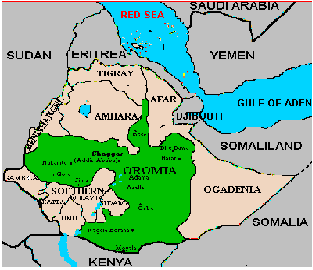Location: Horn of Africa; in what is today Ethiopia. Oromia is approximately located between 3 degree and 15 degree N latitude and 33 degree and 40 degree longitude. Size 375,000 Square Miles, or, 600,000 square kilometers; Larger than France, Italy, Switzerland, Belgium & the Netherlands combined. Population 40 million; 3rd. largest nationality in Africa; single largest nationality in East Africa.
WELCOME TO OROMONET
The Home of Oromo Views & headline News from the Horn of Africa
Gabcast! Gotoota Oromo Haa Yaadannu. #17 - Wallee.
Gabcast! Gotoota Oromo Haa Yaadannu. #17 - Wallee.
Friday, January 12, 2007
Destabilizing the Horn
This article can be found on the web at: http://www.thenation.com/doc/20070122/lone - THE NATION - NAIROBI, KENYA - by SALIM LONE [from the January 22, 2007 issue] - The stability that emerged in southern Somalia aftersixteen years of utter lawlessness is gone, the defeatof the ruling Islamic Courts Union now ushering inlooting, martial law and the prospect of another majoranti-Western insurgency. Clan warlords, who terrorizedSomalia until they were driven out by the Islamists,and who were put back in power by the US-backed and-trained Ethiopian army, have begun carving up thecountry once again. With these developments, the Bush Administration,undeterred by the horrors and setbacks in Iraq,Afghanistan and Lebanon, has opened anotherbattlefront in this volatile quarter of the Muslimworld. As with Iraq, it casts this illegal war as away to curtail terrorism, but its real goal appears tobe to obtain a direct foothold in a highly strategicarea of the world through a client regime. The resultscould destabilize the whole region. The Horn of Africa, at whose core Somalia lies, isnewly oil-rich. It is also just miles across the RedSea from Saudi Arabia and Yemen, overlooking the dailypassage of large numbers of oil tankers and warshipsthrough that waterway. The United States has a hugemilitary base in neighboring Djibouti that is beingenlarged substantially and will become theheadquarters of a new US military command beingcreated specifically for Africa. As evidence of thearea's importance, Gen. John Abizaid, the militarycommander of the region, visited Ethiopia recently todiscuss Somalia, while Chinese President Hu Jintaovisited Horn countries a few months ago in search ofoil and trade agreements. The current series of events began with the rise ofthe Islamic Courts more than a year ago. The Islamistsavoided large-scale violence in defeating thewarlords, who had held sway in Somalia ever since theydrove out UN peacekeepers by killing eighteen Americansoldiers in 1993, by rallying people to their sidethrough establishing law and order. Washington waswary, fearing their possible support for terrorists.While they have denied any such intentions, someIslamists do have terrorist ties, but these have beenvastly overstated in the West. Washington, however, chose to view the situation onlythrough the prism of its "war on terror." The BushAdministration supported the warlords--in violation ofa UN arms embargo it helped impose on Somalia manyyears ago--indirectly funneling them arms andsuitcases filled with dollars. Many of these warlords were part of theWestern-supported transitional "government" that hadbeen organized in Kenya in 2004. But the "government"was so devoid of internal support that even after twoyears it was unable to move beyond the small westerntown of Baidoa, where it had settled. In the end, itwas forced to turn to Somalia's archenemy Ethiopia forassistance in holding on even to Baidoa. Again inviolation of the UN arms embargo, Ethiopia sent 15,000troops to Somalia. Their arrival eroded whateverdomestic credibility the government might have had. The United States, whose troops have been sighted byKenyan journalists in the region bordering Somalia,next turned to the UN Security Council. In anothercraven act resembling its post-facto legalization ofthe US occupation of Iraq, the Council bowed to USpressure and authorized a regional peacekeeping forceto enter Somalia to protect the government and"restore peace and stability." This despite the factthat the UN has no right under its charter tointervene on behalf of one of the parties strugglingfor political supremacy, and that peace and stabilityhad already been restored by the Islamists. The war came soon after the UN resolution, its outcomea foregone conclusion thanks to the highly trained andwar-seasoned Ethiopian army. The African Union calledfor the Ethiopians to end the invasion, but the UNSecurity Council made no such call. Ban Ki-moon, theincoming Secretary General, is being urged to treatthe enormously complex situation in Darfur as hispolitical challenge, but Somalia, while less complex,is more immediate. He has an opportunity to establishhis credentials as an unbiased upholder of the UNCharter by seeking Ethiopia's withdrawal. The Ethiopian military presence in Somalia isinflammatory and will destabilize this region andthreaten Kenya, a US ally and the only island ofstability in this corner of Africa. Ethiopia is ateven greater risk, as a dictatorship with littlepopular support and beset by two large internalrevolts by Ogadenis and Oromos. It is also mired in amilitary stalemate with Eritrea, which has denied itsecure access to seaports. It now seeks such access inSomalia. The best antidote to terrorism in Somalia isstability. Instead of engaging with the Islamists tosecure peace, the United States has plunged a poorcountry into greater misery in its misguideddetermination to dominate the world.
Subscribe to:
Post Comments (Atom)
About Me
Map of oromia

No comments:
Post a Comment
I am responsible for my posting.